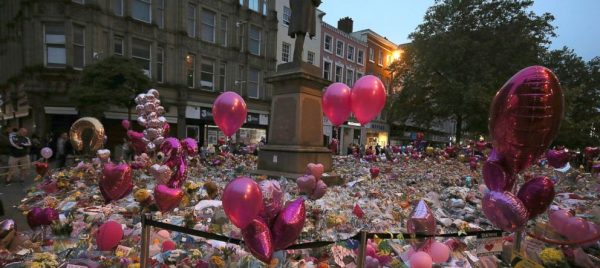
Darryl Morris Weekly – 21.05.21 – Four Years
As much as anything else, I remember the relentless buzz of news and police helicopters. The sky seemed to be busier than the city streets below. Every night, for what felt like weeks, the piercing sound of police sirens cut through any moment of peace.
My apartment overlooked the Manchester Arena. Evenings were often spent watching the crowds spill out of concerts. The ultimate people watching vantage point. At 10.31pm on 22nd May 2017 – four years ago this weekend – it became a front row seat for an unfolding tragedy.
I cannot write this story again. Not really. Not now. But it is a story I would like you to hear. I want you to know what happened that night and I want you to know how our city responded. What follows is a curated extract from reflections I was asked to write for Grazia, The Huffington Post and the Guardian at the time.
A warning: it does contain upsetting details. But nothing from these reflections has changed in my memory. Not a single part of this has faded. This is how I recall it now, moment by moment, when I close my eyes:
I’d not long returned home after my evening radio show. My girlfriend and I had just enough time to exchange pleasantries when the thunderous sound of an explosion rumbled through our living room. We shared a silent look in the knowledge that whatever that was, it wasn’t good.
I made my way out of the building and onto the street below. Some people were merrily making their way home, oblivious to the scene they were walking away from, others looked shaken. I approached a man and he agreed to talk on the record as he clutched his young daughter under his arm, her bunny-ears headband knocked and hanging to the side of her head – an innocence violated – clinging on. His first words were a sucker punch. Suicide bomb. His testimony was calm, almost cold. Smoke. Chemical smell. Corpse. My heart sank into my stomach as I made my way through the crowd. People all too keen to speak as I passed, to offload, to convince themselves it wasn’t a dream.
The emergency services fell from the sky in convoys of ambulance and fire crews. Paramedics and passersby a-like tended to the injured. Shrapnel wounds and blooded heads. The scene set around me as officers comforted parents, comforting children. I made my way back to our studios for a night of rolling news. The show no presenter ever wants to host.
A long, dark night gave way to sunrise. I stumbled from the studios at 7am and blinked my way into the morning sun. Manchester was quiet and reflective, but it carried on. Commuters hurried to offices and cranes and building sites swung into action – and so too did the benevolence of a city scorned.
Thousands gathered in the town hall square, beneath the beating sun, for a poignant vigil. We cried. We laughed. We embraced our friends and strangers a-like and the on-looking police and paramedics shook a thousand hands. A statement of compassion and community so loud that it echoed through news channels around the world. We decided, that afternoon, that we were going to write our own history.
Blood banks overflowed. A group of 12-year-old girls huddled together in the winding queue to donate, determined to help people that could so easily have been them. Hospitals were flooded with food and clothing. Stories of compassion emerged from the night; the taxi drivers ferrying people from the scene for free, the homeless man who rushed into the face of terror to help save the lives of strangers, the pizza company that delivered towers of free food to parentless children.
The usual characters were quick to sow their seeds of conflict. Manchester roared back by adopting Don’t Look Back in Anger as it’s anthem of defiance. A spontaneous rendition would ripple through the crowd at almost every gathering. We made sure that twenty two of our friends and neighbours hadn’t lost their lives in the name of hatred and division, but peace and solidarity.
A few weeks later, 50,000 people stood shoulder to shoulder with the biggest pop stars in the world at the One Love Manchester concert. Many of them had been there that fateful night, some for their first ever gig. Their uncertainties at being part of another large crowd eclipsed by the desire to sing and laugh and… live. It is hard, rightly, for us to comprehend what the attacker intended to achieve that night, but I feel certain it wasn’t a police officer dancing with children to a performance by Justin Bieber.
This weekend, my talkRADIO show comes from Manchester, the finest city in the world.
Figan Murray – the Mum of Martyn Hett, one of the twenty two – joins me to reflect on the last four years. She faces her grief with a remarkable grace and has channeled it into a fierce determination. She campaigns tirelessly for counter-terror legislation in her son’s name and speaks to children in schools about radicalisation and community cohesion. She is a formidable woman.
I’ll also be joining Times Radio from 11pm on Saturday evening, live from St. Anne’s Square, as the city gathers to remember.
I will re-run what I saw that night until the day I die, but so too will I run the scenes of compassion and kindness. Because this is Manchester… and that’s what we do.
See you in the morning.
Weekend Early Breakfast on talkRADIO – with Darryl Morris – Saturday and Sunday – 5am-7am
May 21, 2021 | No Comments